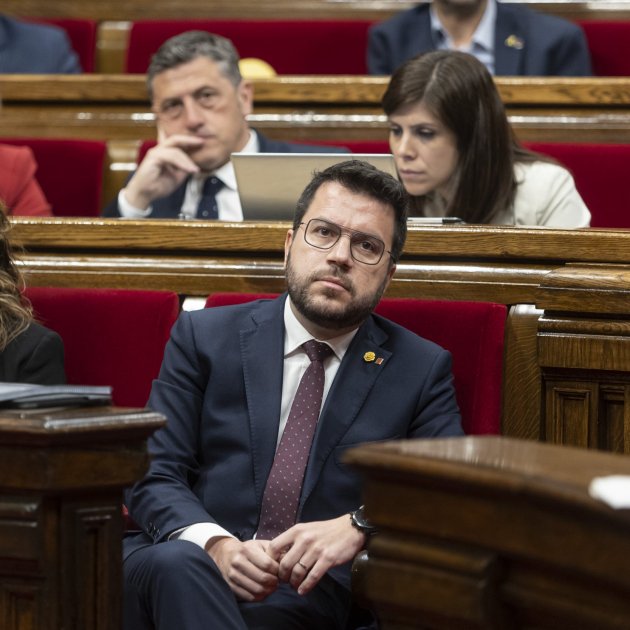The council of academics who are to draft the Clarity Agreement being promoted by the president of Catalonia, Pere Aragonès, have formally begun their work today, after the weekly cabinet meeting this Tuesday approved the names that make up the council. The first formal meeting of the council had, as a guest, Aragonès himself, who put five questions to the academics on the way out of the political conflict between Catalonia and Spain. The questions do not at any time refer to independence or self-determination, and when they ask about the "kind of referendum" that should be called to overcome the situation, they also include the option of "similar mechanisms".
These are five questions that the president has set, working with his closest collaborators and the intervention of the academics themselves, which are meant to be used to structure the report that will serve as the basis for the debate, which Aragonès proposes, between the political groups and society on the future of Catalonia and the way out of the political conflict with the Spanish state. The questions, for which answers that are as wide as possible are requested, are open questions - that is, not with yes or no answers - which range from a generic first inquiry, to the fifth which asks for specifics on the conditions of a referendum (or similar mechanism):
1. What characteristics should a clarity agreement with the Spanish state include to resolve the political conflict?
The initial question is the most generic and broad, with the aim of establishing the basic principles that must guide the drafting of the clarity agreement, according to government sources. The objective is to determine the nature of the conflict and propose a solution.
2. What existing mechanisms in comparative politics would allow the provision of solutions to the political conflict?
This is a common question in political science, which asks about how similar conflicts have been addressed in other places, and which tools used elsewhere could be identified as useful. "With the understanding that it is necessary to chart one's own path", the government emphasizes.
3. What political actors and institutions should take the initiative in order to implement these solutions?
This point is about identifying the set of institutions and figures that need to take an active role in the resolution of the conflict, from Catalan institutions to international bodies.
4. What role should a referendum on the political future of Catalonia, or other similar mechanisms, play in resolving the political conflict?
The aim of this question would be to identify the different types of referendums and analyze which one could be used to resolve the political conflict between Catalonia and Spain. This point underlines the existence of referendums that have a consultative character, those to ratify an agreement, those to exhort a government to start a negotiation, and so on. Therefore, the experts are asked what function the referendum should have.
5. What characteristics should a referendum on the political future of Catalonia, or other similar mechanisms, have in order to maximize legitimacy and inclusion and ensure its validity and implementation?
The aim of this last question is to define tools, mechanisms and forms of voting. Here, the experts would enter into issues related to legitimacy and inclusivity - that all Catalan citizens feel they are taking part - as well as the validity of the referendum, what majority it should have, the type of question, how to read the results in order for it to be implemented, and so on.
"We want the public to vote and for it to be implemented," stressed Pere Aragonès, arguing that in order for the result to be turned into a tangible reality it is necessary to agree on rules and a decision-making mechanism so that everyone accepts the result.
Once the work has started, the experts will have a couple of months to draw up the first report that will serve as the basis for the political debate, something that will not be launched until the May 28th municipal elections are over.
The list of experts
The inclusion on the clarity agreement's council of experts of the professor of Political Science at the University of Valencia, Astrid Barrio, has already raised controversy in recent days, following her forceful criticism of the Catalan independence process in the past. The Academic Council is to be chaired by the Lecturer in Political Theory at Barcelona's Universitat Pompeu Fabra, Marc Santjaume Calvet. The other members of the council announced on Tuesday are Mar Aguilera Vaqués, professor of Constitutional Law at the University of Barcelona; Eva Anduiza Perea, professor of Political Science at the UAB; Marco Aparicio Wilhelmi, professor of Constitutional Law at the University of Girona; Pau Bossacoma Busquets, professor of Law and Political Science Studies at the UOC; Elisenda Casañas Adam, professor of Constitutional Law at the University of Edinburgh; Lesley-Ann Daniels, researcher at the Barcelona Institute of International Studies (IBEI); and Josep Lluís Martí Màrmol, professor of Philosophy of Law and Politics at the UPF. All of them will have the right to receive remuneration for attending the sessions held by this body.
